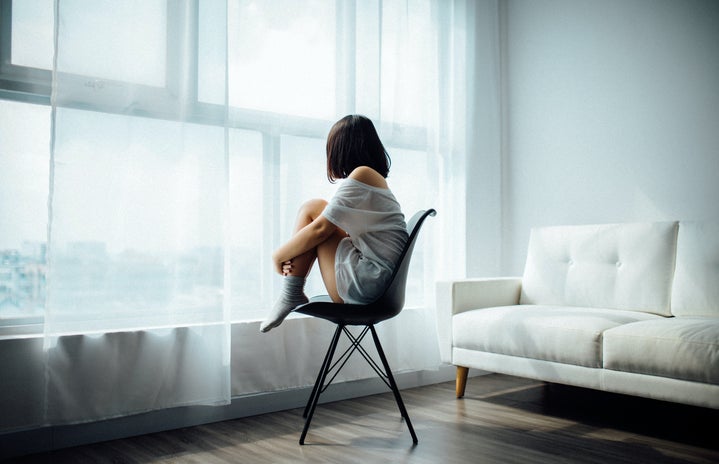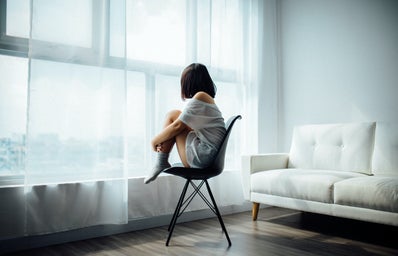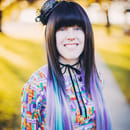By Erin Antoch
From the day we’re born to the day we die, we’re learning. Constantly gathering and computing information that helps us grow as individuals in one way or another. At age five, I learned how to read and what it meant to tell a lie. At age eight, I learned how to write in cursive and that my father has the same handwriting as Santa Claus. At age ten, I learned that winning isn’t everything, but that I’m the kind of person who craves victory at all costs. And at age twelve, I learned what it means to hate your body.
For me, it started gradually. I saw girls in magazines and in movies that I wanted to look like, but could not compare to. In sixth grade, standing five feet tall and weighing in at a meager 100 pounds, I started counting calories and watching what I ate to try to achieve this elusive Marilyn Monroe-meets-Kate Moss figure that was so widely advertised to me. I can recall days when I was simultaneously counting the calories in a peanut butter and jelly sandwich in my mind and wearing a polka dot training bra stuffed with tissues to create the ‘right’ curves. I remember this vividly, and it strikes me even to this day because I was literally altering my body to fit these standards without even knowing why I wanted to fit them. All I knew was that I had a longing to look like those girls; I would compare myself to everyone around me and feel a competitive urge to be skinnier than them, better than them. I began equating popularity with attractiveness, and attractiveness with thinness. In my mind, the less I weighed, the prettier I was.
By ninth grade, it had progressed to a point where I had developed my own little tricks and mannerisms to minimize my caloric intake. If I became a vegetarian, I wouldn’t have to eat my whole dinner. If I was late for the bus, I wouldn’t have time to eat breakfast and my mom couldn’t blame me for it. If I took too long on my test in class, I’d have to come in at lunchtime and it wouldn’t raise questions. If I go into the big stall in the bathroom, I’ll have room to do jumping jacks to burn a few extra calories. If I was a Christian, I could participate in fasting and no one could say anything about it.
So I did.
I would love to sit here and claim that this is just a personal piece about my own journey with my body image, but unfortunately that’s not the case. According to the National Eating Disorder Association, 8 percent of ten year old girls admit that they think they’re fat. 81. That’s 81 percent that should be having fun at recess, but instead are comparing their bodies to their classmates’. 81 percent that have metabolisms at their prime of their life, but are still contemplating eating a chocolate chip cookie “just in case.” 81 percent that should be full of joy and happiness and hope, but instead are filled with insecurity and envy and self-loathing.
The list is endless as to the dark sides of eating disorders. But the worst, by far, is that they work. There’s a period of time at the dawn of an ED that makes you feel beautiful. You’re losing weight, just like you wanted; you’re getting compliments and attention, your fingers stay wrapped around the belt loops to prevent your once-fitted jeans from sagging as they slide off your hips with each step, and a sense of pride engulfs you that seems to raise your chin and lift the corners of your mouth without your knowledge with no cease in sight. You’re skinny and you’re confident, and you are achieving something. You are winning. For the first time that you can remember, you’re starting to like your body again.
This is the glamour that is perpetuated about anorexia, bulimia and other eating disorders. It’s the skinny, popular girls that come out of bathroom stalls wiping their mouths with a smile on their face. It’s the bragging to friends about the replacement of a main food group with the tossing back of laxatives. It’s the fad dieting and the “Is butter a carb?” and fitting into jeans after a week of fasting and looking amazing in them as if that’s all it takes.
What they do not show are the realities of ED’s: the lilac crescent moons tattooed beneath your eyes from fatigue; the classes you fail as you spend your time counting calories or planning workouts instead of paying attention to lectures; the clumps of hair that emerge in your comb from vitamin deficiencies; the yellow, rotting teeth from stomach acid crashing against them multiple times a day; and not to mention the relationships that are destroyed in the process as you choose your eating disorder over your friends.
The media needs to stop perpetuating an “ideal” body type in order to allow men and women alike to find solace in who they are. This isn’t to say that men don’t face these issues as well, because they do; increasingly, men are becoming more susceptible to eating disorders as they become more and more objectified in the media. An ideal and equally unrealistic body type — the Liam Hemsworth’s, Zac Efron’s and Ryan Gosling’s — is perpetuated for men as well. To add insult to injury, EDs are even harder for men to admit to and receive help for because it’s considered “feminine” to diet and dislike your body (and God forbid any men have feminine characteristics or hobbies).
We need to move away from the mindset that eating disorders are inherently feminine; we need to change the culture that women should focus on their bodies more than other things, that diets are normal for girls and that hating your body is just a part of life — so that affected men may be able in turn to reach out too without a feeling of shame. What I dealt with and overcame is not a fashion statement. It’s not trendy, it’s not cool and it’s not glamourous.
We need to change the culture before we can change the statistics.



